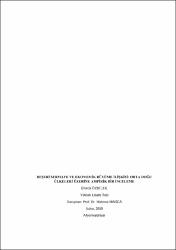| dc.contributor.author | Elveda ÖZDİLEK | |
| dc.date.accessioned | 2019-04-30T05:34:57Z | |
| dc.date.available | 2019-04-30T05:34:57Z | |
| dc.date.issued | 2019 | |
| dc.date.submitted | 2019 | |
| dc.identifier.uri | http://hdl.handle.net/11630/5682 | |
| dc.description.abstract | Bu çalışmanın amacı beşeri sermaye ile ekonomik büyüme arasındaki ilişkiyi analiz etmektir. Beşeri sermaye bireylerin sahip olduğu bilgi, beceri ve deneyimi ifade etmektedir ve ekonomik büyüme ile ilişkilendirilmektedir. Bu doğrultuda oluşturulan çalışma üç ana bölümden oluşmaktadır. Birinci bölümde; beşeri sermaye ve ekonomik büyüme üzerinde durulmuş ve aralarındaki ilişki açıklanmıştır. İkinci bölümde; Orta Doğu ülkelerinin ekonomik durumu, demografik ve sosyal yapısı hakkında genel bilgilere yer verilmiştir. Üçüncü bölümde; öncelikle konu ile ilgili literatür incelemesi yer almış çalışmada kullanılacak yöntem hakkında bilgi verilmiş ve analiz sonuçları raporlanmıştır.
Beşeri sermaye ve ekonomik büyüme arasındaki ilişkinin açıklanmasında panel veri analizinden yararlanılmıştır. Analizde on iki Orta Doğu ülkesinin 1993-2015 yılları arasına ait verileri kullanılmıştır. Analiz sonucunda toplam işgücü ve sermaye oluşumunun kişi başına gelire etkisinin negatif, beşeri sermaye göstergesi olarak analize dâhil edilen eğitim ve sağlık göstergelerinin etkisinin ise pozitif yönlü olduğuna ulaşılmıştır. | en_US |
| dc.description.abstract | The aim of this study is to analyse the relationship between human capital and economic growth. Human capital refers to the knowledge, skills and experience of individuals and is associated with economic growth. The study consists of three main chapters. In the first chapter; human capital and economic growth are emphasized and the relationship between them is explained. In the second chapter; general information about the economic situation, demographic and social structure of the countries of the Middle East. In the third chapter; firstly, the literature review related to the subject is given. After that, information was given about the method to be used in the study and the results of the analysis were reported.
Panel data analysis was used to explain the relotionship between human capital and economic growth. In the analysis, the data belonging to the twelve Middle East countries between 1993-2015 were used. As a result of the analysis, the effect of total labor force and capital formation on per capita income is negative, and the effect of education and health indicators included in the analysis as a human capital indicator is positive. | en_US |
| dc.language.iso | tur | en_US |
| dc.publisher | Afyon Kocatepe Üniversitesi Sosyal Bilimler Enstitüsü | en_US |
| dc.rights | info:eu-repo/semantics/openAccess | en_US |
| dc.subject | Beşeri sermaye | en_US |
| dc.subject | Ekonomik büyüme | en_US |
| dc.subject | Panel Veri | en_US |
| dc.title | Beşeri Sermaye Ve Ekonomik Büyüme İlişkisi: Orta Doğu Ülkeleri Üzerine Ampirik Bir İnceleme | en_US |
| dc.title.alternative | The Relatıonshıp Between Human Capıtal And Economıc Growth: An Empırıcal Analysıs On The Mıddle East Countrıes | en_US |
| dc.type | masterThesis | en_US |
| dc.department | Afyon Kocatepe Üniversitesi, Sosyal Bilimler Esntitüsü | en_US |
| dc.relation.publicationcategory | Tez | en_US |



















